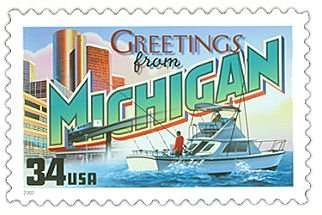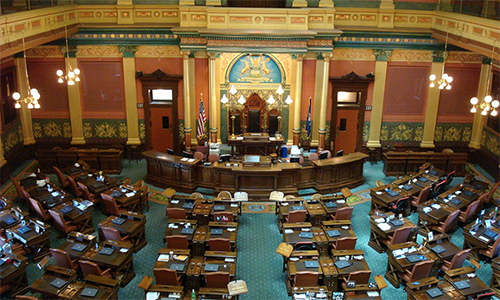Michigan Senate Approves Online Gambling Bill in One-Sided Vote
The state of Michigan has moved another step closer to becoming the fifth US state with formally regulated online gambling, following approval by the state’s Senate on Thursday of House Bill 4926, otherwise known as the Michigan Internet Gaming Act. The Senate approved the House-originated measure late on Thursday night by a 33-5 vote.
HB 4926 was then approved by Michigan’s House in a concurrence vote, meaning it now moves on its present form to the desk of Michigan Governor Rick Scott for final consideration. An earlier version of HB 4926 was approved in June, but amendments incorporated into the bill required the Michigan House to conduct the concurrence vote.
 Online poker is mandated to be among the games offered by licensed online service providers should Scott sign the bill into law, while other casino-style games are also likely to be regulated. The exception is legalized sports betting, which is set to be considered under separate legislation in Michigan.
Online poker is mandated to be among the games offered by licensed online service providers should Scott sign the bill into law, while other casino-style games are also likely to be regulated. The exception is legalized sports betting, which is set to be considered under separate legislation in Michigan.
The HB 4926 measure began as the work of Michigan State Representative Brandt Iden, who reintroduced this version of the bill and companion legislation last December after 2017 efforts fell short. Despite the wide margins by which the current version of Iden’s bill passed both the state’s House and Senate, a lengthy battle among several political factions, including the state’s tribal-gaming industry, had to reach agreement before the overall bill was finalized. Though the bill has yet to be signed, the effort is significant in that Michigan is the first US state with a significant tribal-gaming industry to approve online gambling, or at least come within a governor’s signature of it becoming law.
The basics of the measure remain unchanged for the largest part. If approved, online gambling on licensed sites will be available to gamblers aged 21 and up and are physically in Michigan, or in other approved jurisdictions where online gambling is already legal.
The licensing requirements are industry-friendly. HB 4926’s version limits eligibility for online licensing to the state’s existing land-based casinos, who would apply for a special internet gaming license. The online license process carries a $100,000 application fee plus a $200,000 fee for an initial license, followed by annual renewal fees of $100,000. As most license seekers wold surely seek to partner with software platform providers, those third-party providers require licensing as well; Michigan’s “internet gaming platform provider” licenses would cost $100,000 up front, plus a $50,000 yearly renewal fee thereafter.
Tertiary service providers, ranging from player-ID verification services to affiliates to payment processors and more, can be licensed for a $5,000 up-front licensing fee, plus $2,500 annual renewal fees thereafter.
One of the major amendments to the earlier versions of HB 4926 allows Michigan’s tribal-casino operators the opportunity to be licensed as commercial gaming operators or as tribal operators — whichever they choose. The online-gambling bill also specifies that it has no effect on already existing tribal-state compacts in Michigan, and the finalized version removed language allowing the state’s only three non-tribal casinos, all in or near Detroit, to continue operating in the event tribal nations should somehow be barred from offering off-reservation online gambling through some sort of US federal mandate or clarification.
The combination of the above wrinkles was designed to alleviate the tribes’ concerns that they could somehow be shut out of the Michigan online-gambling market while the non-tribal, Detroit-area casinos were allowed to continue to operate. Such a meshing of licensing options may serve as a template in other US states where tribal gaming is a prominent element of that state’s casino-gambling offerings.
Michigan’s online-gambling legalization effort reportedly retains at least one prominent foe that seeks to shut down the bill at the last minute, by possible civil lawsuit if need be. That’s online gambling’s long-villainous Coalition to Stop Gambling (CSIG), the trust-fund baby of Las Vegas Sands CEO Sheldon Adelson. In Michigan, CSIG continues to demonize the online legalization effort by citing a preliminary analysis of HB 4926 asserting that online gambling legalization might cause a decrease in tax revenue raised from Michigan’s casino, thus negatively impacting funding for schools and other important initiatives.
- The preliminary analysis is almost certainly false, for several reasons, despite the new online gambling offerings being taxed (if signed into law) at a much lower rate. Consider:
- The preliminary analysis assumes total cannibilization of the state’s existing land-based casino offerings by the new online versions, when research shows it to be a complimentary, rather than cannibalizing, offering;
- The preliminary analysis offers no research from existing markets such as New Jersey to explore whether the claimed cannibalization effect exists.
The preliminary analysis bases its “negative impact” possibility based solely on the difference in tax rates between live and online gaming revenue, and even gets some of that wrong, omitting mention of a 1.5% surcharge levied against the three Detroit-area casinos, in part to alleviate any negative-impact concerns.
Then again, truth-telling isn’t part of CSIG’s gameplan in Michigan. It’s all scare tactics and fear-mongering from that astroturf outfit. Meanwhile, Michigan’s Governor Scott has a chance to make his state #5 on the list of online-gambling-approved states. Here’s hoping he signs the bill into law, and soon.




















COMMENTS